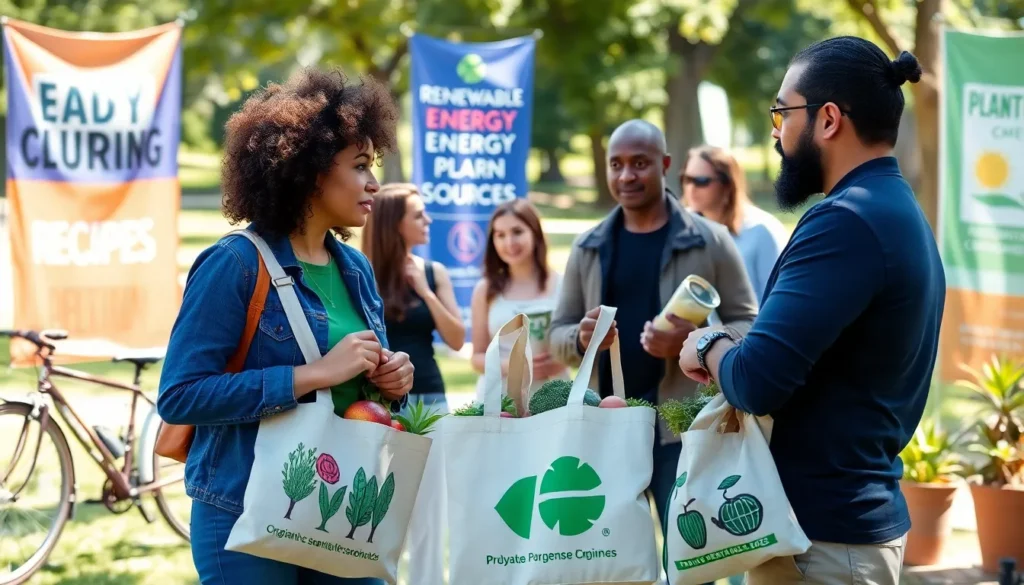Table of Contents
ToggleIn a world grappling with climate change and environmental degradation, eco-friendly challenges have emerged as a vital focus for individuals and communities alike. These challenges not only promote sustainable living but also encourage people to rethink their daily habits and choices. From reducing plastic waste to adopting renewable energy sources, the journey toward a greener lifestyle can be both rewarding and transformative.
As awareness grows, many are eager to tackle these eco-friendly challenges, yet they often face obstacles along the way. Whether it’s the convenience of single-use products or the complexity of sustainable alternatives, navigating this path can feel daunting. However, embracing these challenges can lead to significant positive impacts on the planet and inspire others to join the movement toward sustainability.
Understanding Eco-Friendly Challenges
Eco-friendly challenges play a crucial role in advancing sustainable practices and combating climate change. They prompt individuals and communities to reassess their lifestyle choices and adopt greener alternatives.
Definition and Importance
Eco-friendly challenges refer to initiatives that encourage sustainable behaviors, aiming to reduce environmental impact through collective action. These challenges inspire participants to minimize waste, conserve resources, and engage in practices that benefit the planet. The importance of such challenges lies in their ability to foster a sense of community, educate participants about sustainability, and create a measurable impact on the environment. According to the United Nations, sustainable development aims to balance economic growth, social inclusion, and environmental protection, emphasizing that individual actions contribute significantly to broader goals.
Key Areas of Concern
Several key areas of concern revolve around eco-friendly challenges:
- Plastic Waste: Reducing plastic consumption remains a primary focus. Approximately 300 million tons of plastic waste is generated annually, with a significant portion ending up in oceans and landfills.
- Energy Consumption: The shift from fossil fuels to renewable energy sources is essential. Energy consumption accounts for over 70% of global greenhouse gas emissions, underscoring the urgency of transition.
- Water Usage: Conserving water plays a critical role in sustainability. Daily water usage often exceeds available resources, impacting ecosystems and communities.
- Food Waste: Up to 1.3 billion tons of food is wasted each year, leading to substantial economic losses and environmental damage. Challenges focused on food waste prevention can mitigate these effects.
- Transportation Emissions: Transportation contributes about 24% of global carbon dioxide emissions. Promoting sustainable commuting options, such as public transport and cycling, can significantly reduce this figure.
These areas highlight the diverse challenges individuals face while striving for eco-friendly lifestyles. Addressing these issues collectively enhances the effectiveness and reach of sustainability efforts.
The Impact of Climate Change

Climate change significantly affects ecosystems, species, and human well-being. Understanding these impacts is crucial for implementing effective eco-friendly challenges.
Effects on Biodiversity
Climate change alters habitats, causing shifts in species distribution and threatening extinction for many organisms. Increasing temperatures disrupt migration patterns, while extreme weather events destroy habitats. Coral reefs, for example, experience bleaching due to elevated sea temperatures, leading to the decline of marine biodiversity. Pollinator populations, vital for food production, also experience declines, impacting agricultural systems. According to the Intergovernmental Panel on Climate Change (IPCC), approximately 1 million species face extinction due to climate change-related factors.
Consequences for Human Health
Climate change poses direct and indirect threats to human health. Rising temperatures contribute to increased heat-related illnesses, especially among vulnerable populations. Altered weather patterns result in the spread of vector-borne diseases, such as malaria and dengue fever, expanding the range of the insects that carry them. Additionally, air pollution from fossil fuel use is exacerbated by climate change, leading to respiratory issues and cardiovascular diseases. The World Health Organization (WHO) estimates that climate change causes approximately 250,000 additional deaths annually from malnutrition, malaria, and heat stress.
Sustainable Solutions
Sustainable solutions facilitate eco-friendly practices that significantly reduce environmental impact. These solutions encompass renewable energy options and waste reduction strategies, both essential for promoting a greener future.
Renewable Energy Options
Renewable energy options include solar, wind, hydro, and geothermal energy.
- Solar Energy: Solar panels convert sunlight into electricity, reducing reliance on fossil fuels. They can be installed on rooftops or in solar farms.
- Wind Energy: Wind turbines harness wind’s kinetic energy to generate power. Large wind farms or individual turbines can contribute to local energy grids.
- Hydro Energy: Hydropower utilizes flowing water to produce electricity. Dams or small-scale hydro systems can support sustainable energy needs.
- Geothermal Energy: Geothermal systems extract heat from the Earth for residential heating or electricity generation. These systems require minimal land use compared to other options.
Embracing these renewable energy sources decreases greenhouse gas emissions and fosters energy independence.
Waste Reduction Strategies
Waste reduction strategies focus on minimizing waste generation and promoting recycling.
- Source Reduction: This method emphasizes creating less waste by changing production processes and consumer habits. It involves choosing products with minimal packaging.
- Recycling Programs: Implementing structured recycling programs encourages recovering materials for reuse. Effective community education raises awareness about sorting recyclables.
- Composting: Composting organic waste transforms food scraps and yard waste into nutrient-rich soil. It reduces landfill contributions while enriching gardens and landscapes.
- Upcycling: Upcycling involves creatively repurposing old or unused items into new products. This practice diverts waste from landfills and promotes resourcefulness.
Adopting these waste reduction strategies enhances efficiency and fosters a culture of sustainability.
Consumer Responsibility
Consumer responsibility involves making choices that positively impact the environment and society. By understanding the consequences of their purchases, consumers can drive demand for sustainable products and practices.
Making Informed Choices
Making informed choices requires researching products before buying. Consumers can check labels for certifications like Fair Trade, USDA Organic, or Energy Star. Understanding a product’s lifecycle helps identify its environmental impact. For instance, selecting products made from recycled materials or sustainably sourced ingredients reduces reliance on finite resources. Comparing energy efficiency ratings also empowers consumers to opt for appliances that minimize energy use, ultimately lowering carbon footprints.
Supporting Eco-Friendly Brands
Supporting eco-friendly brands contributes to a sustainable economy. Consumers can prioritize businesses that demonstrate environmental commitment through ethical practices, such as minimizing waste and using renewable energy. Additionally, purchasing from local companies reduces transportation emissions and supports community development. Researching a brand’s transparency in supply chains and adherence to sustainability standards fosters consumer trust and promotes responsible consumption. Engaging with brands actively through social media or reviews can encourage them to adopt even more sustainable practices in response to consumer demand.
Embracing eco-friendly challenges is crucial for fostering a sustainable future. By participating in these initiatives, individuals can significantly impact their communities and the environment. While obstacles may arise, the benefits of adopting sustainable practices far outweigh the difficulties.
Collective action not only enhances awareness but also promotes a culture of responsibility and resourcefulness. As more people engage in eco-friendly challenges, the ripple effect can inspire broader changes in consumer behavior and business practices.
Ultimately, the journey toward sustainability is a shared responsibility that requires commitment and collaboration. Every small step taken contributes to a healthier planet for future generations.







